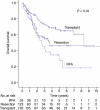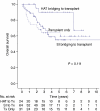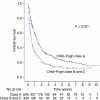Presentation and outcomes of hepatocellular carcinoma patients at a western centre
- PMID: 21929672
- PMCID: PMC3210973
- DOI: 10.1111/j.1477-2574.2011.00362.x
Presentation and outcomes of hepatocellular carcinoma patients at a western centre
Abstract
Background: The present study examines the presentation and outcomes of hepatocellular carcinoma (HCC) at a Western centre over the last decade.
Methods: Between January 2000 and September 2009, 1010 patients with HCC were evaluated at the University of Pittsburgh Medical Center (UPMC). Retrospectively, four treatment groups were classified: no treatment (NT), systemic therapy (ST), hepatic artery-based therapy (HAT) and surgical intervention (SI) including radiofrequency ablation, hepatic resection and transplantation. Kaplan-Meier analysis assessed survival between groups. Cox regression analysis identified factors predicting survival.
Results: Patients evaluated were 75% male, 87% Caucasian, 84% cirrhotic, and predominantly diagnosed with hepatitis C. In all, 169 patients (16.5%) received NT, 25 (2.4%) received ST, 529 (51.6%) received HAT and 302 (29.5%) received SI. Median survival was 3.6, 5.6, 8.8, and 83.5 months with NT, ST, HAT and SI, respectively (P= 0.001). Transplantation increased from 9.5% to 14.2% after the model for end-stage liver disease (MELD) criteria granted HCC patients priority points. Survival was unaffected by bridging transplantation with HAT or SI (P= 0.111). On multivariate analysis, treatment modality was a robust predictor of survival after adjusting for age, gender, AFP, Child-Pugh classification and cirrhosis (P < 0.001, χ(2) = 460).
Discussion: Most patients were not surgical candidates and received HAT alone. Surgical intervention, especially transplantation, yields the best survival.
© 2011 International Hepato-Pancreato-Biliary Association.
Figures






Similar articles
-
Effectiveness of locoregional therapy before living donor liver transplantation in patients with hepatocellular carcinoma who meet the Milan criteria.Transplant Proc. 2012 Mar;44(2):403-8. doi: 10.1016/j.transproceed.2012.01.067. Transplant Proc. 2012. PMID: 22410028
-
Transarterial Chemoembolization versus Radiofrequency Ablation for Recurrent Hepatocellular Carcinoma after Resection within Barcelona Clinic Liver Cancer Stage 0/A: A Retrospective Comparative Study.J Vasc Interv Radiol. 2016 Dec;27(12):1829-1836. doi: 10.1016/j.jvir.2016.06.010. Epub 2016 Aug 21. J Vasc Interv Radiol. 2016. PMID: 27553917
-
Suppressive effects of entecavir on hepatitis B virus and hepatocellular carcinoma.J Gastroenterol Hepatol. 2011 Sep;26(9):1380-8. doi: 10.1111/j.1440-1746.2011.06776.x. J Gastroenterol Hepatol. 2011. PMID: 21884247
-
Combination of Transarterial Chemoembolization (TACE) and Radiofrequency Ablation (RFA) vs. Surgical Resection (SR) on Survival Outcome of Early Hepatocellular Carcinoma: A Meta-Analysis.Hepatogastroenterology. 2015 May;62(139):710-4. Hepatogastroenterology. 2015. PMID: 26897959 Review.
-
Current management of hepatocellular carcinoma.World J Gastroenterol. 2014 Aug 14;20(30):10223-37. doi: 10.3748/wjg.v20.i30.10223. World J Gastroenterol. 2014. PMID: 25132740 Free PMC article. Review.
Cited by
-
Differences in Physician Referral Drive Disparities in Surgical Intervention for Hepatocellular Carcinoma: A Retrospective Cohort Study.Ann Surg. 2016 Feb;263(2):362-8. doi: 10.1097/SLA.0000000000001111. Ann Surg. 2016. PMID: 25563883 Free PMC article.
-
Metabolic Remodeling as a Way of Adapting to Tumor Microenvironment (TME), a Job of Several Holders.Adv Exp Med Biol. 2020;1219:1-34. doi: 10.1007/978-3-030-34025-4_1. Adv Exp Med Biol. 2020. PMID: 32130691 Review.
-
A novel transcription factor-based signature to predict prognosis and therapeutic response of hepatocellular carcinoma.Front Genet. 2023 Jan 4;13:1068837. doi: 10.3389/fgene.2022.1068837. eCollection 2022. Front Genet. 2023. PMID: 36685838 Free PMC article.
-
Readmission After Surgical Resection and Transplantation for Hepatocellular Carcinoma: A Retrospective Cohort Study.Am Surg. 2022 Jan;88(1):83-92. doi: 10.1177/0003134820973739. Epub 2020 Dec 28. Am Surg. 2022. PMID: 33369487 Free PMC article.
-
Prognostic PET [11C]-acetate uptake is associated with hypoxia gene expression in patients with late-stage hepatocellular carcinoma - a bench to bed study.Cancer Imaging. 2024 Mar 22;24(1):42. doi: 10.1186/s40644-024-00685-9. Cancer Imaging. 2024. PMID: 38520026 Free PMC article.
References
-
- Bosch FX, Ribes J, Diaz M, Cleries R. Primary liver cancer: worldwide incidence and trends. Gastroenterology. 2004;5(Suppl. 1):S5–S16. - PubMed
-
- Parkin DM. Global cancer statistics in the year 2000. Lancet Oncol. 2001;2:533–543. - PubMed
-
- El-Serag HB, Mason AC. Rising incidence of hepatocellular carcinoma in the United States. N Engl J Med. 1999;340:745–750. - PubMed
-
- Mor E, Kaspa RT, Sheiner P, Schwartz M. Treatment of hepatocellular carcinoma associated with cirrhosis in the era of liver transplantation. Ann Intern Med. 1998;129:643–653. - PubMed
MeSH terms
Substances
LinkOut - more resources
Full Text Sources
Medical
Research Materials

